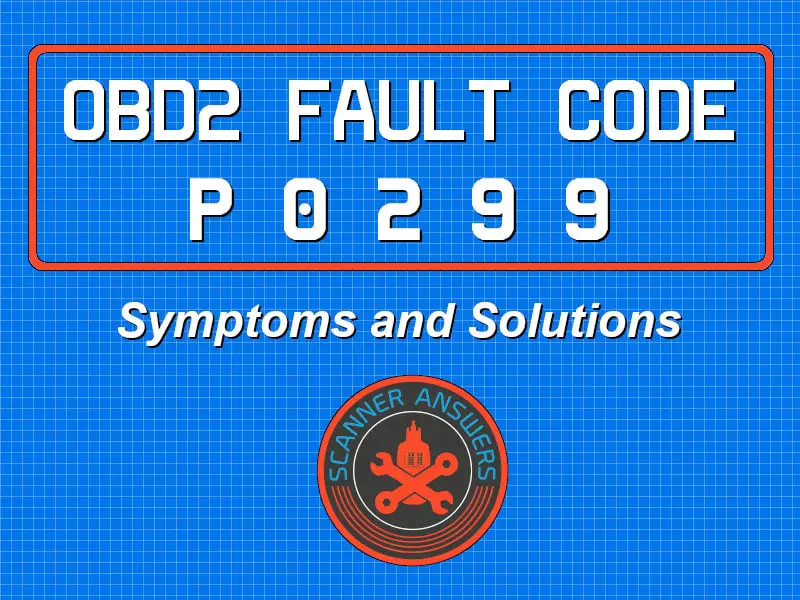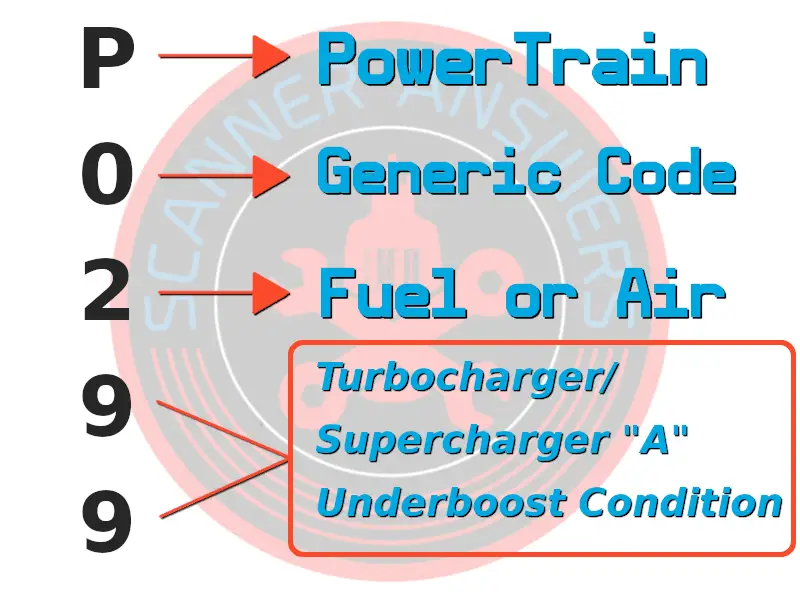b
Meaning of P0299 OBD2 Generic Code
The technical definition of P0299 code is: Turbocharger/Supercharger “A” Underboost Condition.
In certain Audi and Volkswagen vehicles, the definition of is: Boost Pressure Regulation Control Range Not Reached
Simply put, this trouble code signifies a lack of boost from the forced-induction system in your vehicle. It could be due to limited air getting through your air intake, a failed turbo, or many other things!
This diagnostic trouble code applies to import and domestic vehicles equipped with force-fed gasoline or diesel motors. We’ve seen it most on the Chevy Cruze. So if you’re here because you have a Chevy Cruze with a Po299 code, keep reading!
Dre Dan did a nice video showing how to troubleshoot this code on an Chevy Cruze with a Turbo. He walks you through the components of the turbo and shows where the fault may be so you don’t end up replacing things you don’t need to!
You may have a different vehicle, but the troubleshooting steps he took should be helpful on your own ride.
What are the causes of P0299 Trouble Code?
If the ECU detects a low boost or underboost condition, it will trigger the check engine light and the P0299 will display on your OBD2 scanner. It will also revert to limp mode to protect the engine from further damage. And as you likely know, limp mode is not good because this means a serious lack of engine performance.
The potential causes are many. Here’s the most common causes of this DTC:
-
- Failing Turbocharger
- Air intake hose blocked or broken
- Boost sensor dirty or failed
- EGR Emissions issue
In certain Ford vehicles, this trouble code stem from sticking VGT vanes, a faulty VGT actuator, EGR system fault, or a faulty injector control pressure (ICP) sensor.
Generally speaking, the P0299 code is most likely caused by a broken or failing turbocharger or supercharger. Other causes include a bad boost pressure sensor or a vacuum leak in the system. But I saw a crazy instance where this trouble code was triggered by low oil pressure, which can instantly be solved by filling the engine with the proper amount of oil!

What are the symptoms of P0299 DTC?
The first symptom is an illuminated check engine light. If the ECU is in limp mode, you will notice a lack of power and acceleration. If the problem is caused by a faulty or failing turbo or supercharger, you will hear faint and distinct mechanical noises emanating from the turbo.
This code should be taken seriously.
Neglecting the symptoms may damage the catalytic converter or engine, which will potentially cost a ton of money to fix.
How much does it cost to fix P0299 fault?
It really depends on the severity of the issue. Here’s a quick reference (Note: due to rising mechanic labor rates, we have just revised these cost estimates as of November 2023):
- Replace Turbocharger – $1,630+
- Air intake hose – $130 to $320
- Boost sensor – $125 to $230
- EGR Emissions issue – $110 to $1,200 (it depends on the exact issue)
If you can fix this code yourself, you’ll save a ton of money. Watch that video above from Dre Dan and you might find fixing this fault is cheaper than expected!
If the problem is caused by air leaks or air restrictions in the intake system, replacing a couple of hoses won’t cost a lot of money.
However, the same can’t be said if the problem is caused by a broken turbo or supercharger. Replacing turbo parts will cost thousands in parts and labor, not to mention the associated cost of tuning the vehicle to ensure a reliable fix.
But if the problem is caused by trivial issues such as lack of oil pressure, simply adding a quart or two of high-quality motor oil will correct the fault. In some extreme cases, replacing the oil pump should also fix the problem, but this will cost more money than buying a can of oil.
Turbocharged vehicles are making a comeback in the quest to improve fuel economy and reduce emissions. However, force-fed motors require more maintenance and more expensive to diagnose and repair. Keep this in mind when dealing with a P0299 code in your turbocharged vehicle.
You may also see codes like the P0235 or P0238 showing up if you have turbo boost issues.
-Mike